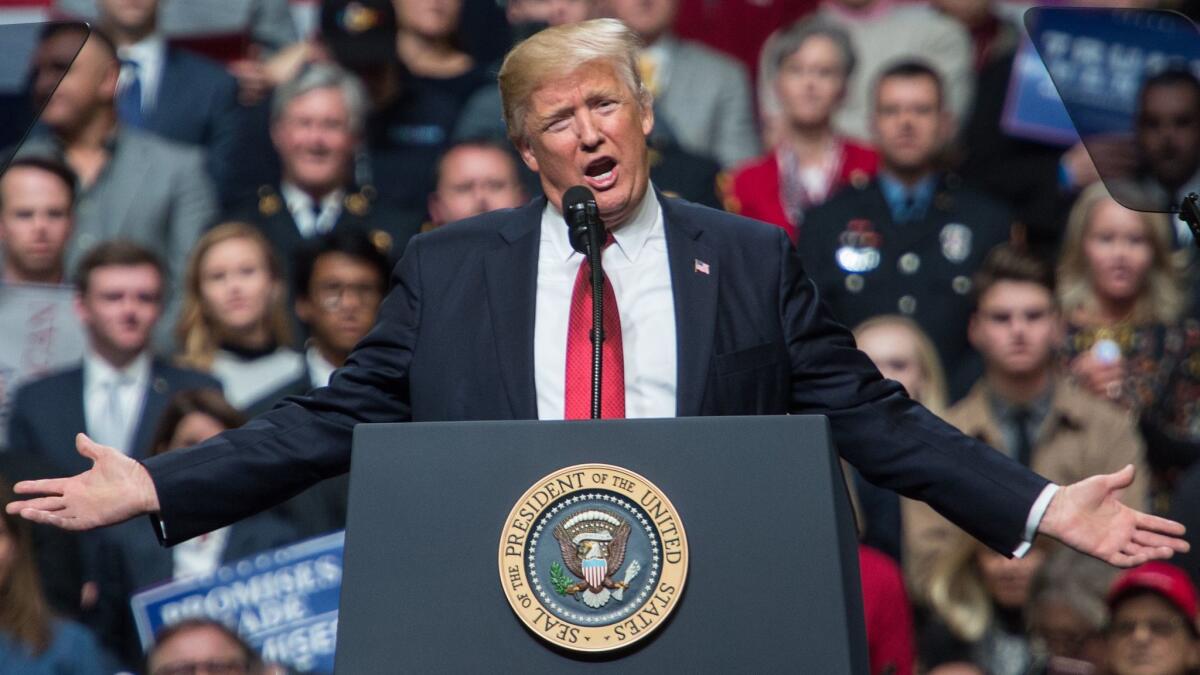Do psychiatrists have any business talking about President Trump’s mental health?

So many norms of politics and civic discourse have been shattered in the year that ends this Sunday. And not every smashed convention this year has been the handiwork of President Donald J. Trump.
In a book of essays published in October, two dozen psychiatrists and psychologists challenged strictures laid down by their professions’ leaders and publicly probed Trump’s mental state. “The Dangerous Case of Donald Trump” is a recitation of evidence for what they contend is Trump’s malignant narcissism, hedonism and sociopathy.
Their consensus has two thrusts: First, the nation’s 45th president is a “clear and present danger to the United States, and to the well-being of its citizens.” And second, as a profession, mental health practitioners are bound by a legal and ethical duty to warn the public of the danger he poses.
The authors’ defiance has won them a harsh rebuke from Dr. Jeffrey Lieberman, a past president of the American Psychiatric Assn. Lieberman denounced the book of essays as “tawdry, indulgent, fatuous tabloid psychiatry.”
But in an essay published this week in the New England Journal of Medicine, a psychiatrist and philosopher defends her colleagues’ willingness to challenge a decades-old prohibition on the practice of psychiatry in the public square.
In an era in which virtually everyone fancies him or herself qualified to render a psychiatric diagnosis, asks Dr. Claire Pouncey, should actual mental health professionals really be muzzled?
She readily acknowledges that the psychiatrists and psychologists who speak up will not actually have examined the person whose psyche is under discussion. Even so, she asks, mightn’t they have some valuable insights to inform the public debate?
The book of essays, edited by Yale School of Medicine psychiatrist Dr. Bandy X. Lee, has been a finger in the eye of the American Psychiatric Assn., which in 1973 issued a prohibition against public diagnosis by its members. In what is widely known as “the Goldwater Rule,” the APA declared it “unethical for a psychiatrist to offer a professional opinion” on a public figure “unless he or she has conducted an examination and has been granted proper authorization for such a statement.”
That rule was crafted to avert any repeat of a Cold-War-era incident that caused the psychiatry establishment acute embarrassment. In an article titled “The Unconscious of a Conservative,” Fact Magazine reported in 1964 that 1,189 psychiatrists believed Goldwater to be “psychologically unfit to be president.” Goldwater went on to sue the magazine for libel — and won.
Almost a decade later, the APA’s first-ever ethics committee crafted the Goldwater Rule.
In a “clarification” issued this March, the APA doubled down on the 44-year-old rule by broadening its prohibition against members’ public musings on a leader’s mental health, Pouncey reports. Two months into the Trump administration, the APA said the rule should be understood to apply to “any opinion on the affect, behavior, speech, or other presentation of an individual that draws on the skills, training, expertise, and/or knowledge inherent in the practice of psychiatry.”
That did not stop such psychiatric luminaries as Harvard University’s Dr. Judith Lewis Herman and Dr. Leonard Glass, along with a clutch of mental health professionals mostly steeped in the psychoanalytic tradition, from offering their perspectives on Trump’s psychological makeup in the bestselling book.
Pouncey, a psychiatrist in private practice and a fellow at the Philadelphia College of Physicians, calls these essayists “thoughtful, experienced, well-meaning mental health professionals.”
In the spirit of their professions’ highest ethical principles, she writes, “the authors take themselves to be contributing to the improvement of the community and the betterment of public health.”
“I believe that the APA, in the interest of promoting public health and safety, should encourage rather than silence the debate the book generates,” Pouncey adds.
She also cautioned the psychiatric establishment against enforcing “an annotation that undermines the overriding public health and safety mandate that applies to all physicians.” The American Medical Assn.’s ethical standards, by which all physicians are bound, says, “a physician shall recognize a responsibility to participate in activities contributing to the improvement of the community and the betterment of public health.”
To justify mental health professionals’ right to weigh in, then, Trump’s mental state need not be so dangerous as to be disabling, or to require his removal from office. If psychiatrists believe their insights will improve the public’s health, she suggests, their public commentary should be welcomed.
“Standards of professional ethics and professionalism change with time and circumstance, and psychiatry’s reaction to one misstep in 1964 should not entail another in 2017.”
Lieberman, for his part, remains unconvinced.
In a letter to the editors of the New England Journal of Medicine, Lieberman says he believes Lee, Pouncey and the rest are “acting in good faith and are convinced they are fulfilling a moral obligation.” But the history of psychiatry is littered with examples of mental health professionals being “exploited” for political purposes, he wrote, citing doctors who gave cover to Nazi eugenics policies and those who helped confine dissidents to mental hospitals in the People’s Republic of China.
“Although moral and civic imperatives justify citizens’ speaking out against injustices of government and its leaders, that does not mean that psychiatrists can use their medical credentials to brand elected officials with neuropsychiatric diagnoses without sufficient evidence and appropriate circumstances,” he wrote. “To do so undermines the profession’s integrity and credibility.”
Follow me on Twitter @LATMelissaHealy and “like” Los Angeles Times Science & Health on Facebook.
MORE IN SCIENCE
11 science stories we’re looking forward to in 2018
Exercise is good medicine for boosting memory and thinking skills, new guidelines say
From the dazzling to the disheartening, 2017 was a remarkable year for science







